
12.04 Ubuntu Developer Summit Proceedings
I just put together the 12.04 UDS proceedings. Thanks to all the track leads who contributed their content. You can read it [here](https://fridge.ubuntu.com/2011/11/17/12-04-ubuntu-developer-summit-proceedings/).
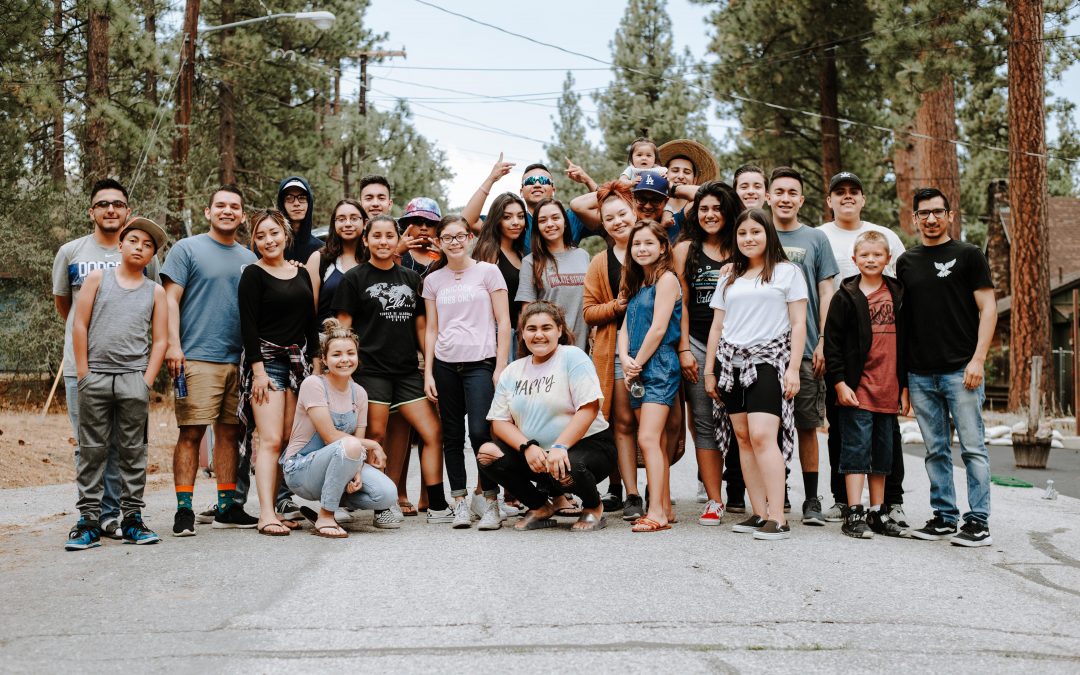
Where’s Chuck 2
One more:

From [Chris Coulson](https://twitter.com/#!/chrisccoulson/status/136881241449443328):

Want to make yours? [Grab the Chuckout in GIMP format](https://ubuntuone.com/1ChepwQCRzUMF0rzHxWg4h).

Where’s Chuck?
On Google+ Chuck has been doing the rounds. I figured I should share it here too…

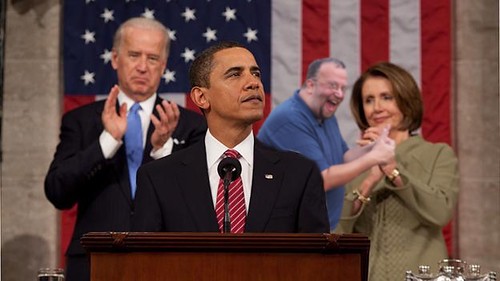
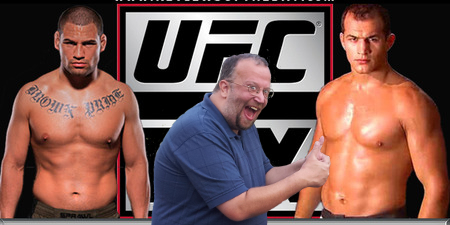
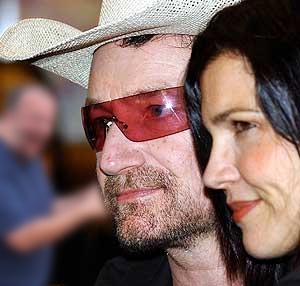
From [Jorge](https://castrojo.tumblr.com/post/12847980271):

Want to make yours? [Grab the Chuckout in GIMP format](https://ubuntuone.com/1ChepwQCRzUMF0rzHxWg4h) and post your creations online.

Scaling Up
Since I got back a week ago from [UDS](https://uds.ubuntu.com) in Orlando I took a few days off work and will be off Monday and Tuesday this week too (I will still be around, I am just taking a few days to work on [The Art of Community 2nd Edition](https://www.artofcommunityonline.org/)).
I have a big list of blog entries that I want to write to follow up on much of the work that happened at UDS. As such, please bear with me as I get this content online over the next few weeks. Some of this is specific to certain projects and some of it is more general to the community, our culture, and how we can make Ubuntu a fun, exciting, and rewarding place to be. I will also be presenting the focus and roadmap for the *Canonical Community Team* soon to ensure everyone can see where the team will be focusing.
I want to frame these blog entries around a set of core themes that we as a community highlighted in our sessions at UDS as areas that we all feel are valuable areas of focus. This set of areas were finalized on the Friday in the *Community Roundtable* session after a busy week of discussions throughout various sessions, round-tables, and the Leadership Mini Summit:
* **Success** – create an approachable and nurturing environment to help our community to contribute and be successful.
* **Constructive** – create an environment of constructive criticism, and protect it against anti-social and un-constructive behavior.
* **Appreciate** – create an environment of gratitude and appreciation.
* **Leaders** – support and motivate our leaders and governors to be successful to deliver leadership that furthers Ubuntu and the community.
* **Everyone** – create and share opportunities for all skills and skill levels to help everyone make Ubuntu successful.
I am not a big fan of *initialism*, but the above does rather neatly map to ‘SCALE’ which is what much of our community is focusing on; growing our contributor-base as we work to get Ubuntu to *200 million users*. The above outcomes are a combination of what people find motivating about participating in Ubuntu (e.g. a feeling of success, enjoying being thanked for your work, helping others), what many feel we need more of (e.g. empowering our leaders, providing opportunity for everyone to participate), and dealing with what people find de-motivating (un-constructive criticism and bickering).
I will follow up over the next week with these further posts summarizing much of the ideas and work discussed at UDS about how we can accomplish these outcomes more and more in the 12.04 cycle. In the meantime, I would love to hear your thoughts and ideas, projects, and approaches about how we can accomplish some SCALE. 🙂
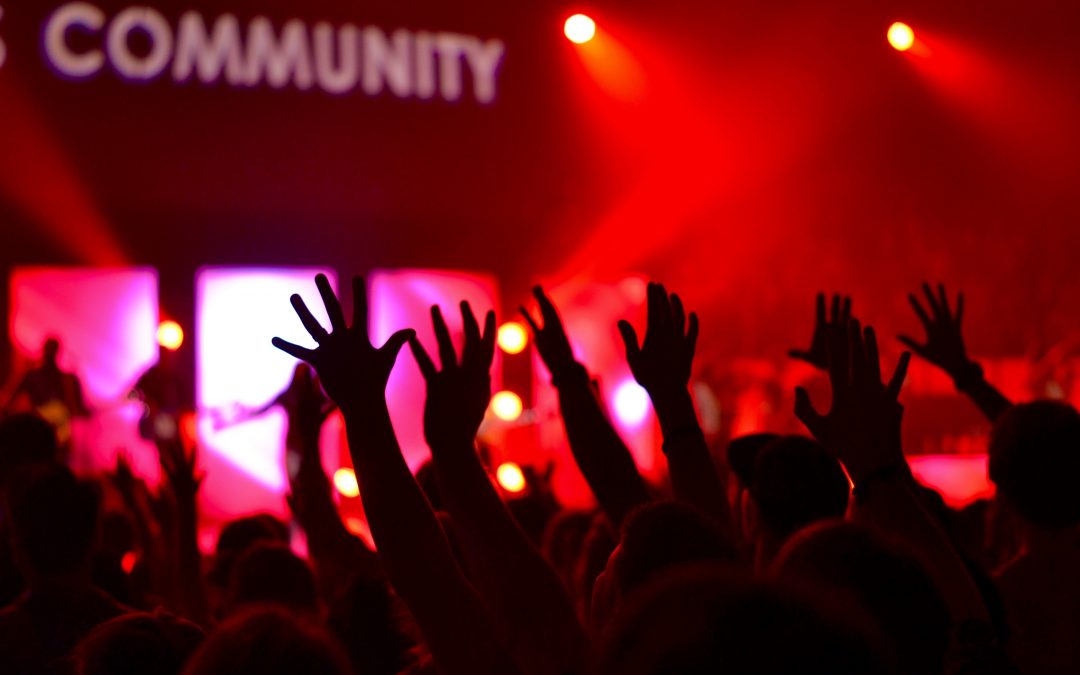
QA Community Coordinator Required: Apply Within
I am looking to hire a new member for my team (the *Community Team*) here at [Canonical](https://www.canonical.com). I am looking for a bright, motivated, and experienced person **to build, maintain and develop a cohesive, productive and effective Ubuntu QA community**. I am looking for someone with solid QA experience particular in the areas of testing and defect management.
This role will be full-time working at Canonical, you will be working from home with regular travel to various events (such as UDS and team sprints), and you will be working in a fast-paced, productive, and energetic environment. Expect to work with evolving requirements and focus and be able come up with creative solutions to interesting QA challenges. This is a really exciting role that is designed to bring huge value to the Ubuntu community in the area of quality by refining, optimizing, and growing our QA community participation.
Key responsibilities and accountabilities:
* Build and maintain a strong, consistent, and consolidated QA community and to act as a point of reference for this community in continuing its growth and opportunities, and resolving issues.
* Maintain a set of online resources, produce content for those resources and build community participation to generate and optimize content for and from the community.
* Develop and refine better working practises to ease and improve how community members and stakeholders interact with the Ubuntu QA team.
* Liaise with the Canonical Ubuntu Platform Team to better align the direction of the Ubuntu QA community with internal QA needs and workflow.
* Regularly acquire and evaluate feedback from the community and our partners to help improve Ubuntu QA.
* Be responsive and sensitive to the concerns, ambitions and direction of the community, our upstreams and business units inside Canonical.
Required skills and experience
* Strong QA skills and experience, strong networking and social networking skills, good relationship building abilities, process driven, able to manage multiple work streams, good prioritisation, independent, willing to travel potentially 25% of their work time, able to resolve conflict, able to communicate well in written form and produce electronic content.
* Experience of working with community Open Source projects, technical experience with QA technologies and workflows.
* Have strong social skills, a good networker and a good technical knowledge of Ubuntu, Power and the Open Source and upstream/downstream development process. Candidates should be process driven, strategically minded and committed. Good public speaking skills a bonus.
* Candidates should provide evidence of existing experience and work in the Open Source community and suitable references.
## How To Apply
To apply, see the [job description](https://tbe.taleo.net/NA3/ats/careers/requisition.jsp?org=CANONICAL&cws=1&rid=245) and apply using the *apply for this Position* button.
Please don’t send me your resume directly; if you use the system it makes it much easier for me to track all the applications.
Good luck!

Ubuntu: More Than The Default Install
In the Ubuntu world (and I am sure in other distributions as well), the choice of what apps we ship in the default install has always garnered much debate and discussion. With each UDS there is a *default apps* discussion, and the following few weeks usually involves some debate over whether the decisions reached made sense. In the past this has involved the addition of TomBoy and other Mono apps, the removal of GIMP from the default install, the addition of PiTiVi, the removal of PiTiVi, the Rhythmbox to Banshee move, and now the move from Banshee back to Rhythmbox.
Before I go on, in terms of the most recent debate: no definitive decision has been made to remove Banshee from the default install. You should [read this ubuntu-desktop thread](https://lists.ubuntu.com/archives/ubuntu-desktop/2011-November/003393.html) for the full details and to offer your (constructive) feedback. This blog entry is not about the specific Rhythmbox and Banshee topic discussion at UDS but a wider discussion about why I think the default app selection is less important than it used to be.
Ubuntu has always sought to present the best of breed software for our users, and this is often a moving target. Open Source is a fluid and organic environment, and what we consider best of breed often changes from release to release. Changes in quality, the vibrancy of the upstream, how well the app integrates into Ubuntu, and how it meets the evolving needs and values of Ubuntu users all play into how these apps are chosen for the default install.
Importantly though, just because an app is not selected for the default install, it *does not mean* it goes away. Quite the opposite: Ubuntu is a *commons*, and the Ubuntu commons spans much further than the default install image.
I am not surprised that some consternation occurs when applications or components are proposed to be added or removed from a default Ubuntu installation. Being on the disc provides a sense of validation and acceptance to our upstreams, and provides an incredible amount of visibility to these applications.
These discussions were particularly important within the context of Ubuntu a few years back where you primarily installed new applications via `apt-get` or Synaptic. While this was simple for many (particularly those of us who remember the dim, dark days of compiling our apps), these tools did not offer a simple experience for our wider user-base who were increasing getting used to browsing and pointing and clicking to get what they needed.
In today’s Ubuntu however, I don’t think this is as much of an issue.
Why? Well, because of this:
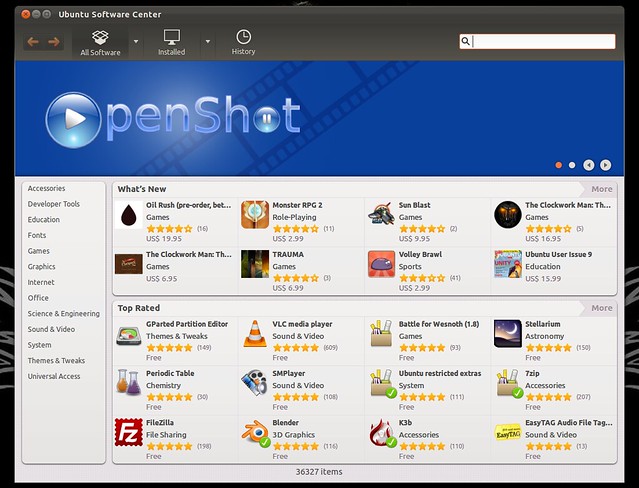
While a few years ago `apt-get` and Synaptic provided a means to install software for us, they lacked the discoverability and ease of use required for many novice users. In addition to this, those tools did not provide a means for a novice to identify what were the best choices for them in the sea of software available for Ubuntu. As such, for software not included in the default install, end users were somewhat in the dark about the best software they could install to meet their needs.
The *Ubuntu Software Center* changed all of that. Now we have a simple, easy to use facility for browsing software, seeing ratings and reviews to get a feeling for what is best of breed, and installing it with just a click. The *Ubuntu Software Center* has helped to make *the cream float to the top*. Even as a veteran Linux enthusiast, I am constantly finding new and exciting finds in there based upon the experiences of our wider community articulated in the ratings and reviews.
As such, while Ubuntu has always shipped a huge archive of available software, today the visibility on that software and the gems inside is better than ever. I think it would be a disservice for us to obsess too much on what is included on the default installation when there is a wealth of content available in the *Ubuntu Software Center*. Default apps are important (particularly for those in non-networked environments), but let’s not forget about the wider commons that in only a click away and all the value it offers.
Speaking personally, I think both Rhythmbox and Banshee are awesome. I personally prefer Banshee (other than some small stability issues), but if we switch to Rhythmbox I am delighted that Banshee is available in a heartbeat and that the incredible contributors in the Banshee community and the Ubuntu Banshee team are helping to ensure the Banshee experience in Ubuntu is fantastic.
This is the benefit of the Ubuntu commons; experiences not delivered in the default installation can still bring huge value to millions of Free Software users around the world. The same can be said for the many other applications I use every day that we don’t ship by default; such as the GIMP, Inkscape, gtk-RecordMyDesktop, OpenShot, Chromium, XChat-GNOME, Bluefish, Getting Things GNOME!, Lernid, and more.
I am not trying to downplay the importance of the default apps discussion — it is important, and we should handle these discussions with professionalism and accuracy in making those decisions — but let’s not forget that there is a wealth of incredible content available in the rest of the commons too.

Leadership Summit Part Two Today
Today part two of the leadership summit will be happening at UDS. This morning we fleshed out the topics we are going to discuss (each broken into 20 minute *lightning discussions*) and they include:
* Growing Motivation
* Leadership Futures
* Leadership Self Assessments
* The Role of the Community Council
* How do we Grow Leaders
* The Canonical <-> Community Leadership Connection
* Expectations of the Canonical Community Team
The session will be today and Thursday in **Bonaire 2** at **3pm Eastern Time**.
If you are not here in Orlando, you can remotely participate (find out more by [clicking here](https://uds.ubuntu.com/participate/remote/)). The remote participation has been great; thanks to everyone who has joined us.
Thanks also to the Community Council, LoCo Council, the Membership Boards, and many other leaders for joining these sessions; we are coming up with some great next steps and key themes.

UDS In Full Swing
Here we are in Orlando at a hectic but productive and fun UDS. The atmosphere here is great; in our track (the *Community* track) I am noticing a sense of shared spirit and focus on improving how our community operates, and how diverse and productive it is.
We have touched on many topics, including:
* Reviewing the survey results and evaluating different solutions.
* How we can help Ubuntu to be an *appreciative* community and grow a culture where we thanking each other and our teams for their contributions and how those contributions help each other.
* Discussion around ideas and opportunities for Ubuntu on Televisions, Tablets, and Phones.
* How we can empower our community to build *Ubuntu experiences*; that is, building small teams to build experiences such as “streaming music from your computer to your television” or “streaming music to remote speakers”.
* How we can deal with anti-social conduct and unconstructive bickering and make a more pleasant and fun community while still welcoming and encouraging constructive criticism.
* Reviewing the Application Review Board and identifying how we can refine how the board can help app devs get their apps in Ubuntu.
We also had a great leadership summit session yesterday, and tomorrow we are going to have the second session. Based on feedback of the first session, we are going to tighten up and better focus the topics so we can get through more content, and encourage wider participation. I would love to see this leadership focus be a common theme at UDS.
When I get back home next week I plan on blogging about each of these different topics at UDS to share what was discussed, what conclusions we came to, and what the next steps are.
Thanks to everyone who has joined us here in Orlando, and thanks to everyone who has been [remotely participating](https://uds.ubuntu.com/participate/remote/).
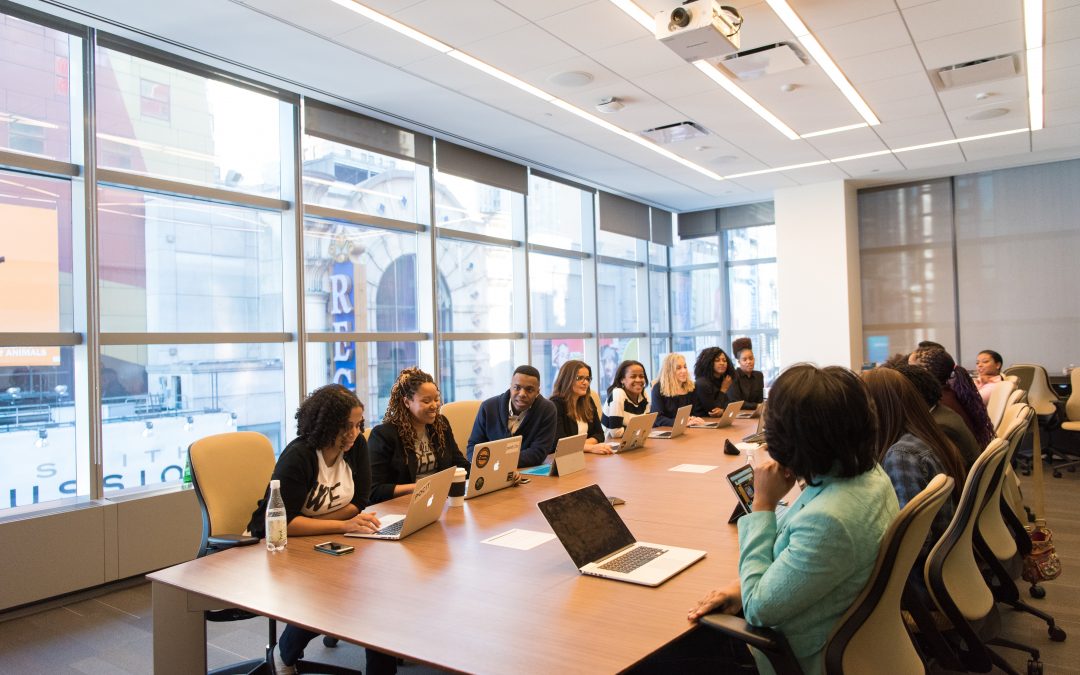
Leadership @ UDS
Today we start our [Ubuntu Leadership Mini Summit](https://archivedblog.jonobacon.com/2011/10/17/mini-leadership-summit-at-the-ubuntu-developer-summit/) here at the [Ubuntu Developer Summit](https://uds.ubuntu.com). Be sure to add your leadership topics to the [ideas wiki page](https://wiki.ubuntu.com/UDS-P/LeadershipSummit) and join us.
If you are not here in Orlando, you can remotely participate (find out more by [clicking here](https://uds.ubuntu.com/participate/remote/)). The session will be today and Thursday in **Bonaire 2** at **3pm Eastern Time**.
I look forward to seeing you all there!

Ubuntu Community Survey Next Steps: Enhancing Recognition and Credit
*This post is part of a series of posts discussing next steps based upon findings in the [Ubuntu Community Survey Report](https://archivedblog.jonobacon.com/2011/10/24/ubuntu-community-survey-results/) that was released recently. The goal of these posts is to focus on solutions, and I would like to encourage your comments and discussion to be focused on areas in which we can drive solutions forward*.
Sorry folks, this is a little longer than I would like, but it covers some important points which I am keen to hear your views and ideas on.
One pattern of feedback outlined in the survey was a desire by some respondents to see better recognition and credit for the contributions that they make to the community. This was one of the responses when survey participants were asked how we can improve the level of influence and impact that the community feel on the project.
It seems a fairly simple and unsurprising piece of feedback – when people contribute their time and effort to Ubuntu, the least they should expect is a sense of gratitude and thanks for their contributions. While *entitlement* is the enemy of a community and can be a disruptive force, I don’t believe that the majority of this feedback is born out of a sense of entitlement; other feedback in the survey suggests that recognition and appreciation for contributions is a really motivating and pleasant side of contributing to Ubuntu, and who wouldn’t want more of that? 🙂
Now, we have tried to attack this problem before. Some will remember when we built the *Ubuntu Hall Of Fame*; this project was designed to highlight many of the great contributions to Ubuntu, but it had two unintended side effects:
1. It didn’t really achieve the goal of a community feeling a personal sense of thanks from someone who benefited from their contribution.
2. For those who did not make it to one of the Top 10 lists on the site, some felt like their contributions were not as valuable or appreciated.
I think these lessons are interesting. For the former, I believe that recognition, thanks, and acknowledgement needs to feel *personal*, and making Ubuntu more personal is something my team has been increasingly focusing on over the last cycle (but there is definitely lots more work to do). I suspect most would agree that getting an automated email saying you are a top contributor, or an automated messaging thanking you for a contribution to a team is far less compelling than when a member of a team or user personally reaches out and thanks you for your work.
As Ubuntu has scaled up into the large community it is these days, I think we have sometimes lost elements of this sense of personal connection, and the survey results speak strongly to the desire to retain and optimize our community for these experiences where our community can offer thanks and positive re-enforcement of contributions. This is something I am really keen to hear your ideas about. How do you feel we can provide more opportunities for people to see each others contributions, for our users to see these contributions, and to provide an avenue for people to thank each other more for their contributions?
I think another aspect of this desire for and enjoyment of thanks and appreciation is that said appreciation coming from someone who you respect and admire makes it *even more* motivating. We have always known that the Ubuntu community is something of a cult of personality, and I don’t believe any of us are immune to big smiles when someone we respect or admire appreciates what we do. I am curious to see if there are ways in which we can better connect those who inspire us to see our work when it happens and to thank us where appropriate. In most Open Source communities which only have 10 or 20 people, this is easier: the scope is much smaller, and influential leaders can often see almost all the contributions, but in Ubuntu with our many teams and hundreds of contributors, I think we have to think more smartly about how we do this. I am keen to hear your ideas or suggestions if you have thoughts on how we can do this better.
Following on from this, and to the second point I raised about the *Hall Of Fame* above, is that there is an unintended side effect when a subset of the wider contributor base get acknowledgement and others don’t; de-motivation from those who *don’t* get the kudos. A good example of this is UDS sponsorship. For every UDS Canonical provides financial support for a large number of community contributors, but of course we have a limited budget so we can’t financially support everyone. Every community member is welcome to apply for sponsorship support, and everyone has their application reviewed by a number of people in Canonical, but due to budget constraints we don’t get to send everyone who applies. Many people who apply…many really *great* contributors…don’t get to do simply because of these budget limitations. Unfortunately the number of awesome Ubuntu people far exceeds the budget of people we can financially support to send to UDS.
While those who do get sponsorship are naturally happy and motivated to be going to UDS, those who don’t get sponsorship support sometimes feel quite de-motivated, and some feel insecure about how Canonical or leaders in Ubuntu view their contributions and “*why wasn’t I chosen, particularly given all my contributions to Ubuntu?*”.
Now, I have made it pretty clear a number of times that *many great people don’t get sponsorship support* (mind you, maybe I could improve and widen this message further), but the de-motivation often still exists in some. I suspect that part of the reason for this is that either getting sponsorship support or not is a pretty binary option; you either get it or you don’t, and there is no graduation in feedback. As such I suspect some feel like they won and some feel like they lost.
Part of the challenge here is that for every 10 people who do great work, if 1 person gets kudos and thanks, 9 people don’t, and I would like to explore ways in which we can reward, motivate, and appreciate our community’s contributions, but not de-motivate those who don’t get the kudos. With a community the size of Ubuntu, not every contribution will have someone saying thanks, and I think that would be an unrealistic expectation. I do though feel we have plenty of scope to increase this sense of personal appreciation further. I also think we as a community can come up with some cool ideas for solving these challenges.
My hunch here, and I am completely open to ideas, which I am keen to discuss here and at UDS, is that we are best doing this at the team level. Ubuntu is a network of different teams, and I am curious to explore ways in which we can empower teams to ensure their respective contributors feel this sense of motivation and appreciation for their work.
Another string to this bow could be identifying better ways of users and leaders offering thanks and gratitude to the team as opposed to the individual. While less personal, I suspect that many contributors to the Documentation Team (as an example) would feel a sense of empowerment and pleasure if some of our users were able to explicitly thank the Documentation Team for their work. Would you folks agree with this sentiment?
This is a wide and complex topic, but an important one for us to focus on, and while I have a set of ideas and things I think could work, I am keen to hear your thoughts about concrete plans and approaches we can take to increasing the level of personal recognition and acknowledgement of contributions. What are your thoughts?
## Next Steps
* As part of the [Ubuntu Leadership Mini Summit](https://archivedblog.jonobacon.com/2011/10/17/mini-leadership-summit-at-the-ubuntu-developer-summit/) at [UDS](https://uds.ubuntu.com), I want to discuss this topic in more detail and explore what other solutions we can put in place to better provide this sense of credit.
* Daniel Holbach will also be [holding a UDS session](https://blueprints.launchpad.net/ubuntu/+spec/community-p-celebrating-dev-contributions) on this topic and more specifically directed to developers (as part of this developer growth efforts). He will follow up soon with details on the session.
* I am going to reach out to our leaders in other teams (e.g. IRC Council and LoCo Council) to discuss how we can approach these challenges.
